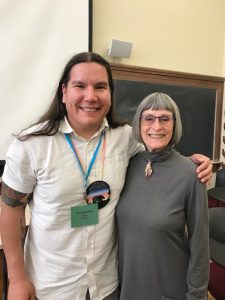 I’m back from the Big Smoke – the Centre of the Universe – Toronto where I gave a workshop with Waubgeshig Rice at the Creative Non Fiction Collective Conference. The conference was remarkable for the diversity in its presenters: Lee Maracle and Tanya Talaga in conversation; Carol Off, Elizabeth Renzetti and Naben Ruthnum in a panel on Voice; and Kamal Al-Solaylee who gave the keynote on the Friday night.
I’m back from the Big Smoke – the Centre of the Universe – Toronto where I gave a workshop with Waubgeshig Rice at the Creative Non Fiction Collective Conference. The conference was remarkable for the diversity in its presenters: Lee Maracle and Tanya Talaga in conversation; Carol Off, Elizabeth Renzetti and Naben Ruthnum in a panel on Voice; and Kamal Al-Solaylee who gave the keynote on the Friday night.
Waub, originally from Wasauksing First Nation, is a journalist and author. He drove down from Sudbury where he works for the CBC, to engage with me in thoughtful conversation, a conversation we began last June at The Writers Union conference in Vancouver. We were exploring the role of story and the relationship between Indigenous and non-Indigenous in Canada.The classroom at Emmanuel College was full of writers eager to talk about finding ways to replace walls with windows through the stories they write and the relationships they create.
Waub is a warm, straightforward person, an excellent writer, a loving dad and husband who communicates in a deep rich voice. He told us what it was like growing up as an Indigenous person in Canada. The room was silent and respectful. I spoke from my personal experience about building bridges with Squamish Nation through the research and writing of Whale in the Door. Then we opened the conversation to hear from the other writers.
One woman joked that she had hoped there would be five rules to follow in writing respectfully about Indigenous people and creating relationships. When she realized this was not in the cards, she contemplated that the whole process was going to be “messy.” This provoked much laughter. I offered my experience with a Squamish Nation language teacher and friend, Alroy “Bucky” Baker. One day, I tried my newly learned Squamish language words on Bucky – Ha7lh skwayel (which means good day) and the rest of my dozen or so expressions that I have practiced. It’s a difficult language by the way. When I finished, I asked him if I had pronounced the words correctly. He smiled and said: “Close enough.” This has become my mantra. I am not going for perfection in my relationships with Indigenous peoples. Bound to fail. I am going for understanding, for respect, for closeness. For close enough.
Categories: Uncategorized
Tags: creative nonfiction conference, Waub Rice
